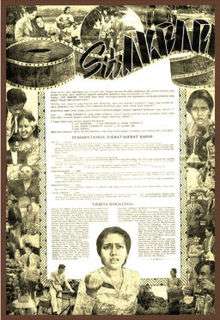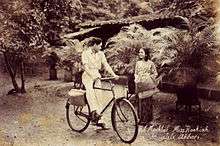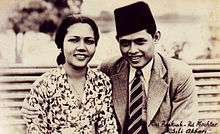Siti Akbari
Siti Akbari is a 1940 film from the Dutch East Indies (now Indonesia) directed by Joshua and Othniel Wong and produced by Tan Khoen Yauw. Starring Roekiah and Rd Mochtar, it follows a couple while the husband commits adultery.
| Siti Akbari | |
|---|---|
 Theatrical poster | |
| Directed by | Joshua and Othniel Wong |
| Produced by | Tan Khoen Yauw |
| Starring |
|
| Cinematography | Joshua and Othniel Wong |
Production company | |
Release date |
|
| Country | Dutch East Indies |
| Language | Malay |
Plot
Siti Akbari (Roekiah) is living happily with her husband. When he begins to wander she stays faithful and he eventually comes back to her.[1]
Production

Siti Akbari was directed by Joshua and Othniel Wong,[1] ethnic Chinese brothers who had received film training in the United States and been active in the film industry of the Dutch East Indies since 1929's Lily van Java.[2] The film's producer, Tan Khoen Yauw, was co-owner of the production studio that made the work, Tan's Film.[3]
The black-and-white talkie featured vocals by the actresses Annie Landouw and Titing, with the keroncong group Lief Java providing background music.[1] Several further cast members, including the stars Mochtar, Roekiah, and her husband Kartolo, had migrated to Tan's after the success of Albert Balink's Terang Boelan (1937); the earlier film's formula of beautiful scenery, music, and action, which Tan's had already utilised in 1938's Fatima, was present in Siti Akbari as well.[4]
The title Siti Akbari is reminiscent of a syair, or traditional Malay poem, written by Lie Kim Hok in 1884;[1][5] his Sair Tjerita Siti Akbari had previously been adapted for the stage.[6] However, the influence Lim's work exerted on the film is unknown: it may have simply lent the title, or it may have been adapted in its entirety.[1]
Release

Siti Akbari premiered at the Cinema Palace Theatre on 29 April 1940.[7] For promotion, Tan's Film release a novelisation of the film shortly afterwards on Kolf Publishers; the writing team was headed by Andjar Asmara.[8] The film proved to be the last starring Roekiah and Mochtar as lovers; he left Tan's soon after over a wage dispute,[9] being replaced by the tailor Rd Djoemala for Roekihati in 1940.[10]
The production is likely a lost film. The American visual anthropologist Karl G. Heider writes that all Indonesian films from before 1950 are lost.[11] However, JB Kristanto's Katalog Film Indonesia (Indonesian Film Catalogue) records several as having survived at Sinematek Indonesia's archives, and Biran writes that several Japanese propaganda films have survived at the Netherlands Government Information Service.[12]
References
Footnotes
- Filmindonesia.or.id, Siti Akbari.
- Filmindonesia.or.id, Othniel Wong.
- Biran 2009, p. 174.
- Biran 2009, p. 176.
- JCG, Siti Akbari.
- Biran 2009, p. 2.
- Bataviaasch Nieuwsblad 1940, Cinema: Siti Akbari.
- Biran 2009, p. 212.
- Biran 2009, p. 227.
- Biran 2009, p. 224.
- Heider 1991, p. 14.
- Biran 2009, p. 351.
Bibliography
- Biran, Misbach Yusa (2009). Sejarah Film 1900–1950: Bikin Film di Jawa [History of Film 1900–1950: Making Films in Java] (in Indonesian). Komunitas Bamboo working with the Jakarta Art Council. ISBN 978-979-3731-58-2.CS1 maint: ref=harv (link)
- "Cinema: Siti Akbari". Bataviaasch Nieuwsblad (in Dutch). Batavia: Kolff & Co. 1 May 1940.
- Heider, Karl G (1991). Indonesian Cinema: National Culture on Screen. Honolulu: University of Hawaii Press. ISBN 978-0-8248-1367-3.CS1 maint: ref=harv (link)
- "Othniel Wong". filmindonesia.or.id. Jakarta: Konfidan Foundation. Archived from the original on 29 August 2012. Retrieved 29 August 2012.
- "Siti Akbari". filmindonesia.or.id (in Indonesian). Jakarta: Konfidan Foundation. Archived from the original on 24 July 2012. Retrieved 24 July 2012.
- "Siti Akbari, Sair Cerita". Encyclopedia of Jakarta (in Indonesian). Jakarta: Jakarta City Government. Archived from the original on 10 October 2012. Retrieved 10 October 2012.